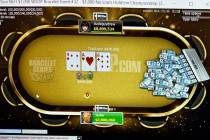Bad-beat poker jackpot players hoping for holiday miracle
Here’s one of those only-in-Vegas holiday stories.
A state Gaming Control Board patron dispute hearing this month generated considerable interest in the local poker community as players who believed they had qualified for a “bad beat” jackpot gathered in a conference room to tell their stories about how locals casino giant Station Casinos had screwed them.
Of course, that’s not the way the case was worded on the docket, but that was the prevailing tone of the hearing that featured Station executives, who had appealed an earlier ruling by investigator Bill Olliges in a case involving poker players Avi Shamir, an 83-year-old who speaks English as a second language and stands to win $60,000, and Len Schreter, a self-proclaimed amateur who says he has played in nearly every Las Vegas poker room.
Playing Texas Hold ‘em at Red Rock Resort on June 7, Schreter got excited because he thought he had just won $12,000 with a straight flush — he actually won around $30,000 — when he exposed his hand out of turn after the last card of the game — the “river card” — had been dealt. Shamir suffered the bad beat with a straight flush with lower-valued cards.
Anyone who has played Hold ‘em knows that once that last card is dealt the game’s final outcome isn’t going to change.
But Station, through attorney L.J. Semenza, said the posted rules for awarding a bad-beat jackpot were violated when Schreter turned his cards over. The rules say the company can void a jackpot if there is any communication between players, and Semenza maintained that Schreter exposing his cards constituted a communication.
Because every player in any of the Station poker rooms gets a share of the bad-beat cash when a player is dealt what in most circumstances is a winning hand, players like Michael Bluestein, who invited me to the hearing, have an interest in the case’s outcome. Bluestein was at Santa Fe Station’s poker room when Schreter and Shamir were playing at Red Rock. He and others who were playing at the time stand to collect about $565 each if the case goes Schreter’s and Shamir’s way.
Shamir was represented at the hearing by his son-in-law, an attorney, who — incidentally — is not licensed to practice law in Nevada. Also attending were Schreter and about a half-dozen other players at the hearing among some 88 people who could get a cut of the rest of the $30,000 bad-beat jackpot if the investigator’s findings are upheld.
They say Schreter’s action was a breach in poker etiquette but not game-changing communication.
Hearing officer Chan Lengsavath allowed San Francisco attorney Peter Bransten to represent Shamir as an assisting family member, not as his lawyer.
There were plenty of bad feelings coming out of the hearing.
Schreter said he felt awful that he had deprived Shamir of $60,000 with his blunder in poker protocol.
Bluestein ripped Station for being greedy and saying that the company has no good reason to withhold the jackpot.
Forrest Caldwell, a Station witness who was erroneously identified as the poker manager at Red Rock at the time of the game, said the poker community dislikes him for his role in the company’s challenge to awarding the jackpot. Some of Caldwell’s friends have labeled my reports from the hearing as “fake news” on social media because of the misidentification of his role in the case.
Bluestein wants the Control Board to rule in the players’ favor and doesn’t hide that he would love to see Station get a black eye in the process.
About the only person who didn’t say much was Shamir, who sat quietly through the 2½-hour hearing and let his son-in-law do the talking.
Now, everybody is waiting for Lengsavath’s assessment and a ruling by the three-member Control Board, which may have a new member with Chairman A.G. Burnett’s recent resignation to enter the private sector when it next meets Jan. 10-11.
Station could generate some considerable holiday good cheer with poker players if execs change their minds and pay the jackpot. They obviously believe in the principle that a rule is a rule and that showing a hand is communication among players, breaking the rules. Station has no financial interest in withholding the jackpot since a separate “drop” taken from the pot in the games funds the bad-beat jackpots.
Will the poker players see a Christmas miracle? Or, should the company lose, would Station take on the role of Grinch by appealing the Control Board’s ruling to Clark County District Court, which is within its rights to do?
Stay tuned for the next chapter in this holiday tale.
Contact Richard N. Velotta at rvelotta@reviewjournal.com or 702-477-3893. Follow @RickVelotta on Twitter.























